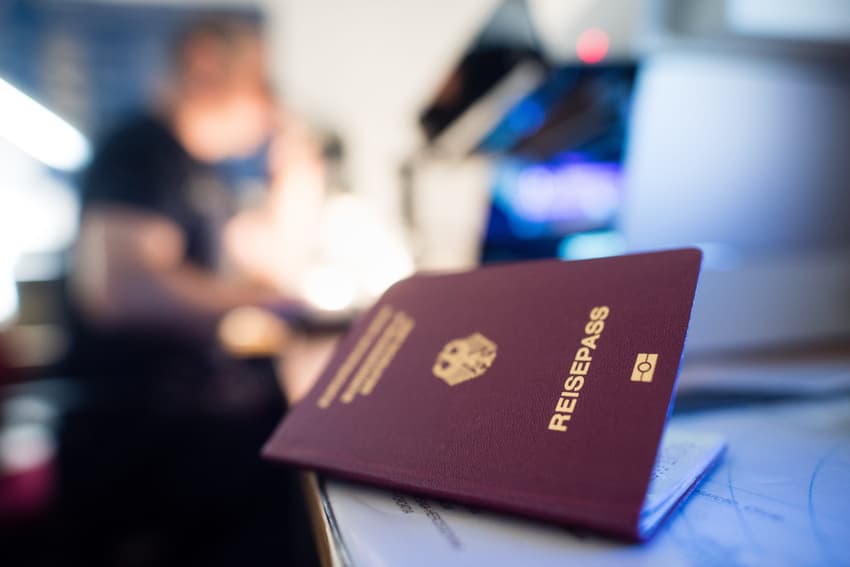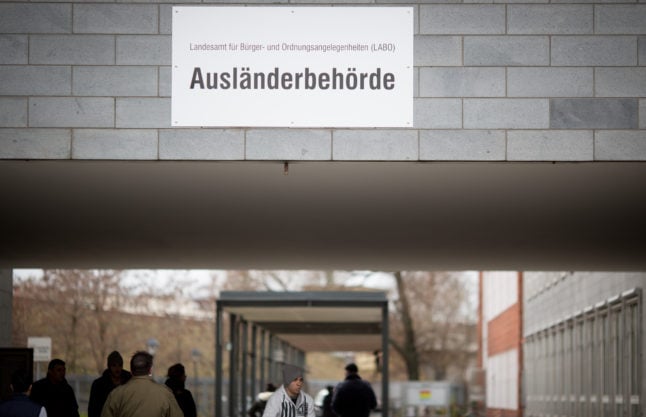Why German citizenship applications in Berlin are facing delays

Starting in 2024, the capital city is set to open a centralised processing office for German citizenship applications. Here's how it will affect foreigners who have already applied for citizenship - or plan to do so.
Starting in 2024, anyone who wants to apply for German citizenship in Berlin will be able to do so through a special centralised office.
Currently, citizenship applications are being processed by the administrative offices (Bürgeramter) in each of Berlin’s districts. Through the new office, set to belong to the foreigners’ authority (Landesamt für Einwanderung), the capital’s senate aims to increase the number of residents who receive citizenship each year from 8,000 to 20,000.
However, according to a draft paper on the "Centralisation of Citizenship Matters", from the Berlin Senate acquired by Berlin’s Tagesspiegel, the transitional phase - which will take place throughout 2023 - is expected to lead to restrictions and delays in processing current naturalisation applications.
READ ALSO: Who are the people taking German citizenship?
What will happen to current citizenship applications?
All applications for naturalisation received after January 1st, 2023 will accordingly have "no further processing of the content" by Berlin’s district offices, according to the draft. In other words, the district offices won't be taking on additional applications this year.
In the case of older applications, priority is to be given to those that "can be expected to be completed by the time the transfer of tasks can be completed,” according to the draft legislation.
Initial counselling appointments (Erstberatungen) from each Bürgeramt are also set to be drastically reduced in the current year.

The entrance to the Foreigner's Office (Ausländerbehörde) in Berlin. Photo: picture alliance / Kay Nietfeld/dpa | Kay Nietfeld
According to the draft, only appointment dates for initial consultations which have already been agreed upon will still take place. These appointments usually take place over the phone, after an applicant has answered a series of questions through email. As a rule, "the allocation of further initial first consultation dates are to be renounced", the draft stated.
The transition process is also likely to be delayed by the fact that many employees at Berlin's district immigration offices are quitting. Rona Tietje, a district councillor for citizen services in Pankow, told the Tagesspiegel that the transition is "already leading to staff turnover," as many employees are already applying for other jobs.
How many people receive citizenship in Berlin?
As of October 2022, there were around 21,725 open naturalization cases in Berlin - around 5,000 of which were filed before 2021, according to the Tagesspiegel.
The number of open procedures, like the processing times of the applications, varies greatly between Berlin's individual districts.
In the easternmost district of Marzahn-Hellersdorf the average processing time was one and a half years, and in Pankow up to two years. The authorities in Mitte are the fastest, with five months, whereas Reinickendorf gives a range between four to 20 months.
However, as applications are transferred from the district to the state level, the waiting times could be increased.
The naturalisation rate in Berlin is lower than in most of Germany’s other 16 states. According to the Office for Berlin-Brandenburg statistics, 7,820 people were naturalised in Berlin in 2021, most of them from Turkey (801) and Syria (605).
In 2022 a total of 6,674 people had been naturalised by October 31st.
Overall, 23 percent of the approximately 3.2 million adult residents in Berlin don’t hold German citizenship and therefore do not have the right to vote at the state and federal level.
Germany’s coalition government presented plans at the end of last year to lower the hurdles for naturalisation. In future, applicants should be able to receive German citizenship after just five years of residence instead of eight.
The process could also be as little as three years in the case of "special integration achievements".
In addition, anyone who wants German citizenship will no longer be required to give up their other citizenship. Dual dual citizenship could thus become the rule rather than the exception.
READ ALSO: How 'enormous backlogs' are delaying applications for German citizenship
Comments
See Also
Starting in 2024, anyone who wants to apply for German citizenship in Berlin will be able to do so through a special centralised office.
Currently, citizenship applications are being processed by the administrative offices (Bürgeramter) in each of Berlin’s districts. Through the new office, set to belong to the foreigners’ authority (Landesamt für Einwanderung), the capital’s senate aims to increase the number of residents who receive citizenship each year from 8,000 to 20,000.
However, according to a draft paper on the "Centralisation of Citizenship Matters", from the Berlin Senate acquired by Berlin’s Tagesspiegel, the transitional phase - which will take place throughout 2023 - is expected to lead to restrictions and delays in processing current naturalisation applications.
READ ALSO: Who are the people taking German citizenship?
What will happen to current citizenship applications?
All applications for naturalisation received after January 1st, 2023 will accordingly have "no further processing of the content" by Berlin’s district offices, according to the draft. In other words, the district offices won't be taking on additional applications this year.
In the case of older applications, priority is to be given to those that "can be expected to be completed by the time the transfer of tasks can be completed,” according to the draft legislation.
Initial counselling appointments (Erstberatungen) from each Bürgeramt are also set to be drastically reduced in the current year.

According to the draft, only appointment dates for initial consultations which have already been agreed upon will still take place. These appointments usually take place over the phone, after an applicant has answered a series of questions through email. As a rule, "the allocation of further initial first consultation dates are to be renounced", the draft stated.
The transition process is also likely to be delayed by the fact that many employees at Berlin's district immigration offices are quitting. Rona Tietje, a district councillor for citizen services in Pankow, told the Tagesspiegel that the transition is "already leading to staff turnover," as many employees are already applying for other jobs.
How many people receive citizenship in Berlin?
As of October 2022, there were around 21,725 open naturalization cases in Berlin - around 5,000 of which were filed before 2021, according to the Tagesspiegel.
The number of open procedures, like the processing times of the applications, varies greatly between Berlin's individual districts.
In the easternmost district of Marzahn-Hellersdorf the average processing time was one and a half years, and in Pankow up to two years. The authorities in Mitte are the fastest, with five months, whereas Reinickendorf gives a range between four to 20 months.
However, as applications are transferred from the district to the state level, the waiting times could be increased.
The naturalisation rate in Berlin is lower than in most of Germany’s other 16 states. According to the Office for Berlin-Brandenburg statistics, 7,820 people were naturalised in Berlin in 2021, most of them from Turkey (801) and Syria (605).
In 2022 a total of 6,674 people had been naturalised by October 31st.
Overall, 23 percent of the approximately 3.2 million adult residents in Berlin don’t hold German citizenship and therefore do not have the right to vote at the state and federal level.
Germany’s coalition government presented plans at the end of last year to lower the hurdles for naturalisation. In future, applicants should be able to receive German citizenship after just five years of residence instead of eight.
The process could also be as little as three years in the case of "special integration achievements".
In addition, anyone who wants German citizenship will no longer be required to give up their other citizenship. Dual dual citizenship could thus become the rule rather than the exception.
READ ALSO: How 'enormous backlogs' are delaying applications for German citizenship
Join the conversation in our comments section below. Share your own views and experience and if you have a question or suggestion for our journalists then email us at [email protected].
Please keep comments civil, constructive and on topic – and make sure to read our terms of use before getting involved.
Please log in here to leave a comment.